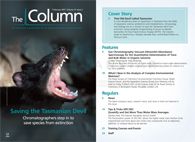Bruker Acquires MSI Company SCiLS
Bruker (Bremen, Germany) has announced the acquisition of SCiLS GmbH in Bremen, Germany. Founded as a spin‑off from the University of Bremen, SCiLS develops software tools such as statistical analysis software, sophisticated visualization viewers, and secure cloud-based services for collaborative interpretation of complex mass spectrometry imaging (MSI) data sets. Currently, 95% of all MSI data is acquired by label-free MALDI imaging systems.
Bruker (Bremen, Germany) has announced the acquisition of SCiLS GmbH in Bremen, Germany. Founded as a spinâoff from the University of Bremen, SCiLS develops software tools such as statistical analysis software, sophisticated visualization viewers, and secure cloud-based services for collaborative interpretation of complex mass spectrometry imaging (MSI) data sets. Currently, 95% of all MSI data is acquired by label-free MALDI imaging systems.
Peter Maass, Theodore Alexandrov, and Dennis Trede, the founders of SCiLS, commented: “We are very pleased by the evolution of SCiLS, and now that SCiLS is a part of Bruker’s global infrastructure it will make mass spec-based imaging more accessible. As MSI is rapidly advancing in multiple application areas, we believe SCiLS has set the stage for becoming the de facto standard for mass spectrometry imaging software.”
Rohan Thakur, Executive Vice President at Bruker Daltonics, added: “Our goal is to advance the MSI field and enable a deeper understanding of the spatial distribution of various molecules in the disciplines of biomarker discovery, pharma drug tissue distribution studies, all the way to translational research in anatomical pathology and future diagnostic applications.”
For more information, please visit: www.bruker.com

Troubleshooting Everywhere! An Assortment of Topics from Pittcon 2025
April 5th 2025In this installment of “LC Troubleshooting,” Dwight Stoll touches on highlights from Pittcon 2025 talks, as well as troubleshooting advice distilled from a lifetime of work in separation science by LCGC Award winner Christopher Pohl.
This information is supplementary to the article “Accelerating Monoclonal Antibody Quality Control: The Role of LC–MS in Upstream Bioprocessing”, which was published in the May 2025 issue of Current Trends in Mass Spectrometry.








